
May 29, 1996
BEN BRADLEE: That's not in Nixon's character.
STEPHEN AMBROSE: There you go.
JIM LEHRER: Rick Hertzberg, where do you come down on the Jimmy Carter thing, particularly what Tom said, Tom Wicker said about, he also did the right thing and it cost him his election?
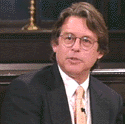
HENDRIK HERTZBERG: Well, I think it shows how -- I don't want to be cynical but maybe unsentimental, that an important quality you need for character is luck. You know, the basic way we judge the success of Presidents is do they get re-elected.
If you look at -- if you look at -- there are -- I don't know of any President we think of as great who didn't -- who lost a race for re-election. Because that confers on you the aura of failure. Even in the case of Carter you can make the argument that he lost because he did things like the Panama Canal and he did a lot of stuff that -- that -- he didn't take -- he didn't spill blood over the Iran hostage crisis and so forth.
STEPHEN AMBROSE: A President who had a wonderful character and he was enormously popular, did lose a bid for election after having won one -- and that's Teddy Roosevelt.
HENDRIK HERTZBERG: Well, but he lost in a --
STEPHEN AMBROSE: It's special circumstances -- three party -- but that comes back to the party loyalty part of the thing that was so much more important then than it is now.
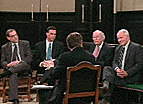 JIM LEHRER: What about that, David McCullough. Rick says that label comes to anybody, like Jimmy Carter, regardless of what he did. He may have done all the right things for the right reasons, but they went sour and now he has a -- he's known as a failed President, he had a failed Presidency.
JIM LEHRER: What about that, David McCullough. Rick says that label comes to anybody, like Jimmy Carter, regardless of what he did. He may have done all the right things for the right reasons, but they went sour and now he has a -- he's known as a failed President, he had a failed Presidency.
DAVID MCCULLOUGH: I don't think he's known as a failed President. I don't think so at all. And I think that we -- he will be judged fairly in the long run whether he served one term or two terms will probably not be remembered. And when you think that virtually every President of this century has had a worse second term than their first term, in some ways it might be advantageous to their long run standing not to run for a second term.
HENDRIK HERTZBERG: Yes, and you do a little thought experiment and you imagine that Truman had run for re-election in 1952 and Bush had not run for re-election in 1992, think how different our views of these two men would be.
DAVID MCCULLOUGH: That's exactly right.
JIM LEHRER: Explain that.
HENDRIK HERTZBERG: Well, if Truman had run in '52, Eisenhower would have hosed him away. And he would be remembered as the guy who -- who fumbled the ball after World War II, left office in disgrace with the United States bogged down in an unwinnable war in Korea.
If Bush had -- if Bush had not run for -- for re-election in '92, he would be remembered as the -- as the President who came in and led the nation in the post war -- in its first great post cold war test of character, passed that test with flying colors in the Persian Gulf and left office at the peak of his popularity.
PEGGY NOONAN: But the gentlemen who become President almost never decide they don't want a second term. They always want it. They're hungry, hungry. They always want it. They want the first term, they want the second term.
 I'll tell you something that I think is connected to means and ends and why people make -- why Presidents make certain decisions. Richard Nixon said something that I think was very smart, he said there are only two kinds of men who run for the Presidency. The first kind wants to be big and the second kind wants to do big things. I think in general that is true. And in general your great Presidents are ones who do want to do good -- big things -- who do have a sense of what is right.
I'll tell you something that I think is connected to means and ends and why people make -- why Presidents make certain decisions. Richard Nixon said something that I think was very smart, he said there are only two kinds of men who run for the Presidency. The first kind wants to be big and the second kind wants to do big things. I think in general that is true. And in general your great Presidents are ones who do want to do good -- big things -- who do have a sense of what is right.
HENDRIK HERTZBERG: And who get really really lucky.
PEGGY NOONAN: It's been said it's smarter to be lucky than it's lucky to be smart. And there's a lot to be said for that, particularly for Presidents.
DAVID MCCULLOUGH: There's one very important ingredient that we haven't talked about and should and that is if a President doesn't have the capacity to move the country with words, that Presidency is in trouble and that's what we expect from the President. And it isn't just being rhetorically poetic or purple. It has to do with conviction and delivery from within.
 And the great Presidents have all, almost without exception, been the Presidents who had that power, that gift. Lincoln, Roosevelt, Theodore Roosevelt had it, though he was not a very good speaker in the conventional sense as we understand it today. But nobody ever doubted that he meant what he was saying. And he was perfectly clearly always about what he would say. And he told the country what he wanted to do, where he wanted to go. And sometimes the words have been put in the mouths of Presidents by -- by other people of eloquence and gift --
And the great Presidents have all, almost without exception, been the Presidents who had that power, that gift. Lincoln, Roosevelt, Theodore Roosevelt had it, though he was not a very good speaker in the conventional sense as we understand it today. But nobody ever doubted that he meant what he was saying. And he was perfectly clearly always about what he would say. And he told the country what he wanted to do, where he wanted to go. And sometimes the words have been put in the mouths of Presidents by -- by other people of eloquence and gift --
JIM LEHRER: You mean speech writers.
DAVID MCCULLOUGH: I think an enormous part of John Kennedy's power is what Ted Sorenson did for him, as Roosevelt's speech writers did for him. But the President has to understand that that's what he says and how he says it is of the utmost importance. I think one of the tragedies of Lyndon Johnson is that he never found somebody who could write for him. His -- the speeches he gave, that wasn't Lyndon Johnson, that wasn't the man --
JIM LEHRER: He was reading somebody else's speeches.
DAVID MCCULLOUGH: Yes. But knowing that you have to convince the country, you have to lead the country, with what you say, as well as what you do, is also an aspect of understanding the job and, therefore, understanding what you have to bring to the job, what your responsibility is and that's an aspect of character.
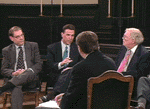 MICHAEL BESCHLOSS: I think one thing we worry about is the fact that often times you have a President who is of admirable character, but we only really see that many years later. Americans in 1952 did not like Harry Truman very much. His poll ratings were in the high 20's. It really took only an additional generation or two to really see great qualities that we didn't see at the time. That's something I think we should keep mind as we are looking at Presidents and Presidential candidates in real time at the moment.
MICHAEL BESCHLOSS: I think one thing we worry about is the fact that often times you have a President who is of admirable character, but we only really see that many years later. Americans in 1952 did not like Harry Truman very much. His poll ratings were in the high 20's. It really took only an additional generation or two to really see great qualities that we didn't see at the time. That's something I think we should keep mind as we are looking at Presidents and Presidential candidates in real time at the moment.
One thing I think we can take some heart from is the fact that if you are a leader who is of inferior character, it's awfully hard to fake that. You can have a wonderful speech writer. You can have wonderful consultants but over a period of time, it's going to be very hard for a President or a possible President to conceal qualities that Americans are going to feel very uncertain about.
JIM LEHRER: More so now because of television or less so or what?
MICHAEL BESCHLOSS: I think more so now, both because both the media and people who are in television and also Americans realize that they have to make some judgments for themselves in the wake of the new system and also because we see so much more of a Presidential candidate, largely on television, the camera in most cases really does not ever lie. And Americans I think have a much better ability now to screen out someone who was unworthy than perhaps we did a generation or two ago.
ROBERT DALLEK: Well, Jim, I think that's the whole point about history will judge. We look back and we make judgments on was this man wise, did he do something sensible. FDR's leadership to take us into World War II was very astute, essential. Lyndon Johnson's leadership on Vietnam -- you talk about constancy -- Johnson committed political suicide over Vietnam, he was committed to that war.

One might make the case that he was a centrist on that war. He fought the war he thought should be fought and one could say, well, wasn't that good character, but, in fact, we remember him in this very negative way. So, it's get back to Rick's point, a lot of this is circumstance. We see -- the context we see it in.
But I think ultimately it has a lot to do with Truman's strength in making the decision about recognizing Israel. Tremendous strength in deciding to use the atomic bomb. Truman's strength in what he did in relation to the Korean War. Judgments are made, but it takes sometimes 20 - 30 - 50 years.
JIM LEHRER: But if you're looking for -- if you're looking at a -- whether it's 20 days after or 20 years afterward or 200 years afterward -- uh -- to say, okay, this President made a terrific decision, fill in the blank. Okay, why did he do it. What caused that -- that man to make that decision and is character then one of the things that you now weigh-- do we bring that in now from the 1990's to something that didn't have anything to do at all to do with what was involved with those kinds of decisions at the time?
BEN BRADLEE: Oh, I don't think so. The truth is supposed to emerge and that's why there are historians. We can't make these judgments on the run like this, because we don't know enough about it, we don't know enough about a person's motive on --
STEPHEN AMBROSE: And we don't know how it's going to come out.
ROBERT DALLEK: That's right.
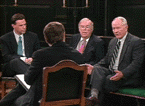 STEPHEN AMBROSE: You take a specific. Eisenhower in the early 1950's, early in his first term, made a decision to overthrow Mossedeq in Iran and bring the Shah back. Boy, for a long time that looked like a terrific decision. Here's a man of character, a strong man, General Eisenhower, standing up to the godless communists and keeping Iran within our orbit. And it just looked terrific, until here came the Ayatollah and we found out how much they hated us. And all of a sudden what Ike did that looked so good for so long doesn't look so good any more. As you see how it comes out is how you make the judgment in the end.
STEPHEN AMBROSE: You take a specific. Eisenhower in the early 1950's, early in his first term, made a decision to overthrow Mossedeq in Iran and bring the Shah back. Boy, for a long time that looked like a terrific decision. Here's a man of character, a strong man, General Eisenhower, standing up to the godless communists and keeping Iran within our orbit. And it just looked terrific, until here came the Ayatollah and we found out how much they hated us. And all of a sudden what Ike did that looked so good for so long doesn't look so good any more. As you see how it comes out is how you make the judgment in the end.
BEN BRADLEE: Well, you long term historians have that luxury. Us short termers, we don't have that luxury.
JIM LEHRER: Meaning the voters as well.
BEN BRADLEE: And the voters have got to -- are caught in the middle. You can't delay that vote.
MICHAEL BESCHLOSS: The case of Lyndon Johnson demonstrates Steve's points I think very well from the opposite extreme and that is if historians later on had seen Vietnam as essential in winning the cold war, which certainly could have been possible, we would look back on Lyndon Johnson, Vietnam, as an example of enormous courage, someone who is even sacrificing his Presidency in pursuit of a larger goal.
STEPHEN AMBROSE: And the current beginnings of the argument are that that's exactly what happened. That because we stood up to the communists in Vietnam, Southeast Asia is doing a lot better today than it would have if what -- if we hadn't have stood up to them. Now, that's revisionist history and it's dealing with what's happening in Asia now --
TOM WICKER: I want to dispute this thesis a little bit that -- about Lyndon Johnson's conduct of the war. I read Mr. McNamara's book recently, for example, and I knew something about that at the time and I think Lyndon Johnson carried on that war beyond any point of rationality and he did it because he feared that the Harvards would say you're the first President that lost a war, and against all reason and against all logic and against all the facts he wasn't going to have that happen. And I don't think that's particularly admirable, but I do think it's a product of character.
STEPHEN AMBROSE: Stubbornness.
TOM WICKER: Stubbornness.
HENDRIK HERTZBERG: That's right and Nixon continued the war for exactly the same reason.
TOM WICKER: Very much the same.
HENDRIK HERTZBERG: And a good test of what we think character means is what do we fantasize that Kennedy would have done. Some say, and I'm among the fantasists that he would have -- he would have taken us out of Vietnam, he wouldn't have -- after the election he would have let it go. Others say no, it -- it would have gone exactly the way it did go--pick 'em.
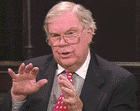 TOM WICKER: I don't think it would have gone exactly the way it did go, because they were two different men in different circumstances. But I have never seen exactly how Kennedy was going to do that if he was going to do it and I've never seen any indication that he would have done it. I think possibly he ...
TOM WICKER: I don't think it would have gone exactly the way it did go, because they were two different men in different circumstances. But I have never seen exactly how Kennedy was going to do that if he was going to do it and I've never seen any indication that he would have done it. I think possibly he ...
STEPHEN AMBROSE: Plenty of indications the other way.
TOM WICKER: He might not have taken us as far into that war, as President Johnson did, but that's a different thing from taking us out of that war. I don't believe he would have done that.
BEN BRADLEE: I think I agree with Rick. I think he listened to people, not his advisers, he listened to a broad -- his friends, lots of friends -- in earlier lives -- friends who were all against the war. I think they would have -- I think he would have succumbed to their pressure.

| Welcome | Broadcast | Essays | Forum | Quotes | Links | Home